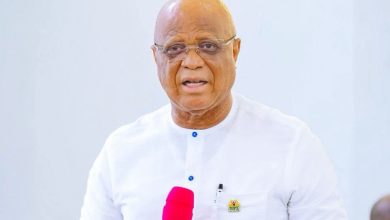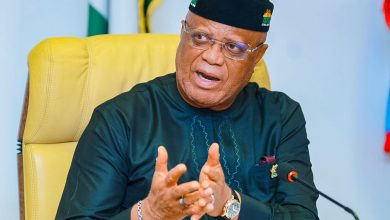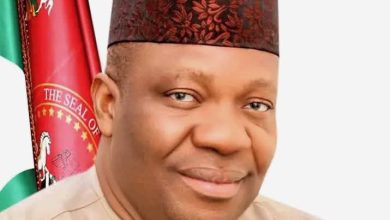
The birth of Akwa Ibom State brought to a fulfilling end an unrelenting long struggle. Its creation as the 21st state of Nigeria was effected on Wednesday, September 23, 1987, following the promulgation of Decree 24 of that year by the then President and Commander-in-Chief of the Armed Forces of the Federal Republic of Nigeria, General Ibrahim Badamasi Babangida. The creation resolved the desire of the people of the then ‘Mainland’ part of the former Cross River State to have their own political entity. Akwa Ibom State is superlatively engrained. A glimpse reveals people with distinctive characteristics- from its rich heritage to the well-known trait of forthrightness and enterprising acumen. The state is well endowed with an abundance of natural resources. Akin to the biblical Land of Goshen (Genesis 47:6), the people are blessed to dwell in an environment enriched with green pastures.
Its christening, ‘Akwa Ibom’, was sourced from its local language which vividly illustrates the supernatural contents and beliefs of the people. The word, ‘Akwa’ denotes “big, great, huge or super’; while ‘Ibom’ connotes ‘Godhead, progenitor, pillar, supernatural or something boundless.’ Even the pronunciation of ‘Akwa Ibom’ comes with an endearing resonance. After creation, its leaders engrafted a hyperbolic slogan for the state as The Land of Promise. Later, it was expanded to The Land of Promise and Fulfilment.
The forebears of the state had envisioned a political entity full of boundless opportunities which will meet the yearnings of the people: a domain of peace, unity and prosperity. As earlier stated, the advocates for the State Creation Movement christened it Akwa (Abasi) Ibom State to reflect their abiding faith and entrustment unto the Almighty God as the omnipotent source of all of man’s provisions.
A renowned historian and colonial scholar, Robert M’Keown (1912), had posited that the inhabitants of the present-day Akwa Ibom State had firm formations amongst some other ethnic groupings as early as 7000 BC. This fact is further attested to by Noah (1979:5), who surmised that the semi-Bantu language spoken by the people, with all its variants, as well as the ethnic formations is possibly one of the earliest and oldest groupings that may have occupied the southern part of the territory now known as Nigeria. Its location in the present abode, lying within a territorial area with the longest natural coast-line, ignited and greatly promoted contacts with European explorers as far back as the 15th Century.
The interface kept being strengthened with more influx of Portuguese, and subsequently the British about the 17th century, largely occasioned by the industrial revolution in Europe. The Europeans engaged in bulk purchase of palm produce from the newfound market to service their soap and other allied industries. They used ‘trade by barter’ with the natives, exchanging their commodities, which were mostly finished goods from their factories in Europe.
The conveyance created a leap in commerce and merchandise for the area which is today Akwa Ibom State. Remarkably, towns like Nwaniba, Itu, Ifiayong, Ikot Abasi, Ibagwa and Oron hosted such outstanding commercial and business enterprises like PZ, UAC and John Holt amongst others. The trade relation fostered greatly. It is on record that Itu, situated in the present-day Akwa Ibom State, became the first administrative centre-point or as may be better called, capital of the then-emerging Nigerian state. An eminent Nigerian scholar, Abasiattai (1987:60), gave credence to this assertion when he stated that “by 1750, the present Akwa Ibom State indigenes had commenced acting as middlemen both to other groups like the Ibos and Ekois and citizens of other regions, in their interaction and trade with the Europeans.”
The exposure gained from regular contact with the Europeans yielded multiple benefits to the people. It recreated lifestyle bringing about the need to improve communication so that the people would be more acquainted with the emerging developments so as to foster an enduring partnership in trade relations. In that wise, they started to learn, imbibing training on literacy, numeracy and European science and technology. The European visits had many features to include religion, economy and politics, with an increasing tendency to take the area as a colony of which they eventually did. Consequently, by 1800, the Akwa Ibom people had started writing English language and communicating with the Europeans in their foreign language. Steadily, Western education developed firmly amongst the people. Areas such as Uyo, Eket, Ikot Ekpene, Oron, Abak and Itu came up as the immediate beneficiary of Western education.
The degree of its success spurred intense interest amongst the people and the Europeans. Some scholars offered incisive commentary. In his assertion, Napoleon Obot (2009:44) stated that “the early and pervasive exposure of the Akwa Ibom person to Western education had broadened his outlook, transformed him intellectually as well as sharpened his sagacity.”
That setting promoted broad-based academic and rational growth in the area. The ‘fertilization’ reinvented perceptions, approaches and communal lifestyles amongst the people, putting them ahead in many areas within the then-emerging nascent Nigerian nation. Congruently, there emerged enlightened and educated sons and daughters of the area who engineered and thought out the pathway towards the development of the people through foreign scholarship programmes and the resultant influence brought about enhanced contributions to the polity and agitations crystallising with the birth of Akwa Ibom State.
They started by unifying fronts to have a common interest in confronting some endemic issues vis-à-vis educational, socio-economic and political challenges, etc. Worthy of mention is the outstanding role that our forebears played in the agitation for Nigeria’s independence and providing socio-economic and political ingredients towards the making of the Nigerian state.
It is noted with a sense of pride that from the formation of Ibibio Union (1928) and later Ibibio State Union (1948), our forebears were consistent in their quest for self-determination through the clamour for state creation, first under the banner of COR (Calabar Ogoja and Rivers) State Movement, later Mainland State Movement (the geographical area of the present abode) and finally, Akwa Ibom State Movement. The dream was tenaciously sustained for about 60 years.
Obviously, the date of Akwa Ibom State’s creation adds yet another uniqueness that may be seen as a divine interplay.
By cosmological calculations, September 23 falls within the day of Equinox – a date the length of time between day and night is equal. Literarily, this is taken as the birth of equality and justice to a people who conceptualised and initiated the process for the restructuring of Nigeria into a federation of states against the concept of regions as it previously existed. The creation date (September 23) and the name [Akwa (Abasi) Ibom] typify the prodigious nature of the state, which is coming to bear with its rising profile in development and the outstanding successes of its indigenes.
Notable patriarchs and pacesetters in the general development of the people and struggle for emancipation are Obong Sampson Udo Idiong, Obong Sampson Udo Etuk, Ekukinam Bassey, Chief Effiong Eyo Okon, Professor Eyo Ita, Dr Esin Anwana Esin, Chief Nyong Essien, Sir Egbert Udo Udoma, Chief Ibanga Udo Akpabio, Chief Ntieyong Udo Akpan, Chief Michael Edet Asuquo Anwana, Sir Robert Umoinyang, Chief O. O. Ita, Dr Clement Isong, Brigadier–General Wellington Umo Bassey, Dr. (Madam) Emma Brown, Chief Bassey Udo Adiaha Attah and Brig. General Udoakaha Jacob Esuene, amongst others. They stood out brilliantly in their fields of endeavour and were good vessels in the agitation and strident advocacy for self-dignity and independence. They aligned with others to confront the Europeans to a standstill during the several constitutional conferences, leading to Nigeria’s independence and similarly initiated the process for the equitable management of the Nigerian state.
For emphasis, Akwa Ibom people referring to our patriarchs, dating back to pre- and post-independence Nigeria, campaigned for the restructuring of the Nigerian state on the basis of the federation as earlier stated, more than any other groupings within the current geopolitical setting. Their advocacy, which was initially resisted and treated with disdain by regionalists, who invariably dominated the ethnic minorities with abrasive tendencies, became the pathway for the building of a new Nigerian state.
That pioneering agitation for the abolition of regions for states eventually came to be the new face of Nigeria in 1967. In yielding to the restructuring campaign, the then Head of State and Commander-in-Chief of the Military Government, General Yakubu Gowon, on May 27, 1967, announced the creation of states. The military ruler had stated: “I wish to make it clear to the nation that honestly, I personally have no vested interest in the creation of any particular state, but there is no doubt that without a definite commitment on the states’ question, normalcy and freedom from fear of domination by one region or the other cannot be achieved.”
Accordingly, 12 states including South Eastern State were created. The creation of South Eastern State answered a bit of the prayer by COR State Movement as Calabar and Ogoja were aligned together while Rivers was treated separately. Though this arrangement accommodated the people of the mainland area now Akwa Ibom, that did not end their quest for a political entity for their homeland.
Historians of contemporary studies have noted the strides of the people. During the colonial period in Nigeria, it is even reported that the Ibibio Union asked for recognition by the British as a sovereign nation (Noah, 1988). In his book entitled, Fulfilment of a Dream, Otoabasi Akpan (2004) hailed the pacesetters of the then pan-Ibibio; the Ibibio Union and later Ibibio State Union in bestowing to Nigeria the concept of the nation-state and how it was to be shaped and run. As Akpan noted, the Ibibio Union was the first organised indigenous body in Nigeria to initiate the concept that Nigeria should be reconstituted into a federation of states, based on linguistic and ethnological consideration.
Evidently, the collective actions of the pathfinders brought an incredible display of ethnic cohesiveness and determination for a group cause. It inspired the upswing of a national movement for the minority groups towards the promotion and recognition of their own identity as distinctive Nigerian communities.
This article takes account of the progression of the people from colonial times to the era of independent Nigeria and the sequences on the struggle for COR State and later the drive for the creation of Akwa Ibom State.
THE STRUGGLE AND BIRTH OF AKWA IBOM STATE 1928-1987
Our forebears were very consistent in their drive for equity and justice in Nigeria. Convinced that their cause was achievable, they did not relent in their pursuit for a state. Quite remarkably, traditional rulers were actively involved in the struggle and eventual birth of Akwa Ibom State.
MEMORANDUM OF DEMAND
On February 25, 1978, paramount rulers of the then Mainland area of Cross River State met to review their quest. At the end of the historic meeting, they took far-reaching decisions on behalf of themselves and the people. They accordingly communicated their resolution in a formal memorandum to the Federal Military Government than under the reign of General Olusegun Obasanjo as Head of State. The text of the Memorandum of Demand is as follows:
RESOLUTION FOR THE CREATION OF A STATE OUT OF THE PRESENT CROSS RIVER BY TRADITIONAL RULERS OF THE MAINLAND PART OF THE CROSS RIVER STATE
“We, the Paramount Rulers and Traditional Chiefs, on behalf of ourselves and the people, who inhabit that area of the Cross River State, known as the Mainland area, have considered the need for balanced and even development of our fatherland through the creation of another state out of the present Cross River State.
“We hereby pray the Federal Military Government, through the Constituent Assembly now producing a constitution for Nigeria to approve the creation of a state, to be known and reflected in the Constitution for the Federal Republic of Nigeria as Akwa Ibom State. The state with a population of about four million people will comprise the present Local Government Areas of Abak, Eket, Etinan, Ikot Abasi, Ikot Ekpene, Ikono, Ika, Oron, Ukanafun and Uyo. Beside the Cross River as the natural boundary, only a state embracing these local government authority areas can solve boundary fights and endless disputes.
“We further resolve that the headquarters of the new state be located in the landmass which lays between Uyo, Abak and Etinan headquarters. The names of the new headquarters will be IBOM, the ancestral home of the entire Mainland Communities. The limits of the new state capital will lie within five kilometres of Abak, five kilometres of Uyo, seven kilometres towards Ikot Ekpene and seven kilometres towards Etinan.
“By this resolution, we the Traditional Rulers, wish to leave a legacy for our children, which will ensure and enhance development, national stability and easy maintenance of law and order.
“We are confident that the creation of Akwa Ibom State will give a further opportunity to the Calabar and Ojoja people for further development in separate states of their own, with the Cross River as the natural boundary between the two states”.
The memorandum was signed for the creation of Akwa Ibom State by the following paramount rulers: Obong Sampson Udo Idiong, president, Traditional Rulers’ Conference and paramount ruler of Ukanafun L. G. A; Obong Simon Tom Akpan-Nsubong II, vice president, Traditional Rulers’ Conference and paramount ruler of Etinan L. G. A.; Obong Thompson Udo Uyoatta Akpabio, treasurer, Traditional Rulers’ Conference and paramount ruler of Eket L. G. A.; Obong Ekpe Obong Atakpa, member, Traditional Rulers’ Conference and paramount ruler of Itu L. G. A.; Obong E. U. A. Arthur (pastor) J.P, member, Traditional Rulers’ Conference and paramount ruler of Abak L. G. A.; Obong C. O. Akpan, member, Traditional Rulers’ Conference and paramount ruler of Ikot Ekpene L. G. A.; Obong Jacob Akpan, member, Traditional Rulers’ Conference and paramount ruler of Ikono L. G. A.; Obong Aman Umoessen, member, Traditional Rulers’ Conference and paramount ruler of Ikot Abasi L. G. A.; Obong Okon E. Isong, member, Traditional Rulers’ Conference and paramount ruler of Oron L. G. A.; Obong Ekpenyong Udoekong, member, Traditional Rulers’ Conference and paramount ruler of Uyo L. G. A.
Dated this 25th day of February 1978 on behalf of ourselves and our people.
READ ALSO: Still As Dreams
AND THE DREAM FINALLY CAME THROUGH
The birth of Akwa Ibom State brought to a fulfilling end an unrelenting long struggle. Its creation as the 21st state of Nigeria was effected on Wednesday, September 23, 1987, following the promulgation of Decree 24 of that year by the then President and Commander-in-Chief of the Armed Forces of the Federal Republic of Nigeria, General Ibrahim Badamasi Babangida. The creation resolved the desire of the people of the then ‘Mainland’ part of the former Cross River State to have their own political entity.
The 1967 exercise by General Gowon saw the creation of 12 states among which was South Eastern State with the present-day Akwa Ibom being apart. That masterstroke by Gowon paved the way for the creation of more states by subsequent governments.
The General Murtala Muhammed administration which came after Gowon also bought into the idea and created seven additional states in 1975 without creating the Mainland Area (Akwa Ibom State) out of South-Eastern State. Rather, the Federal Military Government merely re-christened the state, ‘Cross River State’. The mere name change could not soothe the political desire of the people of the Mainland Area, thus leading to continued agitation.
By 1977, General Olusegun Obasanjo, who succeeded General Mohammed as Head of State set up a Constituent Assembly in Lagos to ratify the draft Constitution initiated towards the return of the country to civil rule. The people took the chance once again and pressed for the creation of a Mainland State. The three representatives of the area to the Constituent Assembly were Mr Donald Etiebet (Ukanafun), Mr Anthony Amba Wills Obong (Uyo), and Mr N. J. Udoiwod (IkotAbasi). And they brought the good tidings of the possibility of state creation in the country.
Sequel to this new ray of hope, the president of the Traditional Rulers Council, Obong Sampson Udo Idiong, who also served as chairman of the State Creation Committee held an emergency meeting on November 30, 1977, and on February 25, 1978, to discuss the modalities for the pursuit of the state creation.
Formally, the meeting by the traditional rulers coined the name “Akwa Ibom State” for the envisaged new state. A memorandum was accordingly drafted for the creation of Akwa Ibom State out of the then Cross River State and signed by the 10 traditional rulers of the mainland region. Secretaries to the committee were Mr Y. W. Bassey and Mr E. U. Okon. The Obasanjo regime did not create any new state in the country, so the demand lingered.
By 1983, after the collapse of the Second Republic of Alhaji Shehu Aliyu Usman Shagari’s administration, paramount rulers from six local government areas of the Mainland part of the then Cross River State submitted a memorandum demanding the creation of Akwa Ibom State to the General Muhammadu Buhari military administration. The creation exercise was not treated by the Buhari dispensation.
However, in 1986 the issue was awoken by the inauguration of the Political Bureau by the Federal Military Government of General Ibrahim Badamasi Babangida. The Political Bureau called for memoranda from the Nigerian public on how the country could be better organised and governed. The opportunity was utilized by the people as they once again renewed the agitation and submitted their memorandum for the creation of Akwa Ibom State.
Among its recommendations, the Political Bureau headed by Professor Sylvanus J. Cookey recommended the creation of Katsina (North) and Akwa Ibom (Niger Delta). Sequel to the recommendations, General Babangida on Wednesday, September 23, 1987, in a nationwide broadcast announced the creation of Katsina and Akwa Ibom States, thus bringing the total number of states as at then to 21.
The creation climaxed a six-decade tenacious agitation for the social and political self-actualization for the people by a group of individuals whose roles will forever be acknowledged. The background of the struggle for the state and its eventual realisation has kept igniting the joy of the people of Akwa Ibom State. It came as a fruit of a dream; dream sustained by faith and commitment and a united purpose serviced by love and sacrifice by the forerunners.
The concomitant circumstances have continued to nourish an unending exhilaration of joy and gratitude to God Almighty by the people of Akwa Ibom State, akin to biblical Israel’s tortuous walk to their Promised Land.




